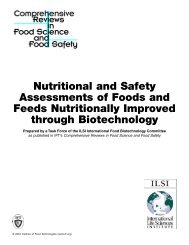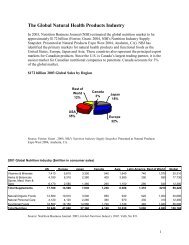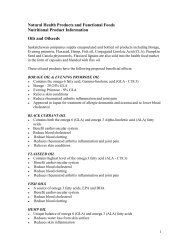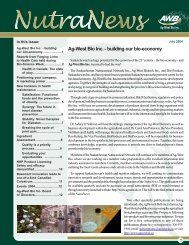Beyond Borders: Global biotechnology report 2010
Beyond Borders: Global biotechnology report 2010
Beyond Borders: Global biotechnology report 2010
Create successful ePaper yourself
Turn your PDF publications into a flip-book with our unique Google optimized e-Paper software.
Biotech will provide the technology and<br />
intellectual property developed by Cuba’s<br />
Center for Genetic Engineering and<br />
Biotechnology, and EMS Sigma Pharma<br />
will develop production capabilities while<br />
providing infrastructural and logistical<br />
support for the global distribution of the<br />
resultant products. EMS Sigma Pharma<br />
entered another agreement with two<br />
Shanghai-based laboratories, Biomabs<br />
and Guijian, to gain a technology platform<br />
for the production of the rheumatoid<br />
arthritis treatment etanercept. Under<br />
this agreement, the company is also<br />
expected to acquire a technology platform<br />
to manufacture five more monoclonal<br />
antibodies in the future.<br />
FK Biotecnologia entered an agreement with<br />
Canada-based ZBx Corporation to conduct<br />
the clinical development of FK’s pipeline<br />
vaccine for prostate cancer. FK plans to<br />
initiate Phase III trials to seek marketing<br />
approval of this vaccine by <strong>2010</strong>. Two other<br />
Brazilian companies, Biocancer and Genoa<br />
Biotecnologia, also have anticancer vaccines<br />
in clinical trials, and the companies are<br />
currently seeking partnerships to further<br />
develop these products.<br />
Financing and investments<br />
There are relatively few Brazilian venturecapital<br />
firms that are actively investing<br />
in high-risk <strong>biotechnology</strong>. Consequently,<br />
Brazilian biotech companies largely rely<br />
on Government grants and income streams<br />
from services. Currently, the Government<br />
accounts for around 65%–70% of total<br />
R&D expenditures.<br />
Stem cell research has been attracting<br />
investments from the Government and<br />
private players. In February 2009, the<br />
Government announced plans to construct<br />
eight laboratories for stem cell research.<br />
The National Bank for Economic and Social<br />
Development (BNDES) and Brazil’s Ministry<br />
of Health, Science and Technology have<br />
funded the project with a total investment<br />
of R$23.6 million (US$12.5 million).<br />
Several global life sciences companies<br />
entered Brazil in 2009 to tap the domestic<br />
market’s potential and leverage its lowcost<br />
advantages. Belgium-based UCB<br />
collaborated with AstraZeneca<br />
to commercialize UCB’s PEGylated<br />
anti-TNF alpha drug, Cimzia, in Brazil.<br />
In another similar agreement, BurnsAdler<br />
Pharmaceuticals — a US-based distributor<br />
specializing in marketing products throughout<br />
Latin America — announced plans to market<br />
Three Rivers Pharmaceuticals’ Hepatitis C<br />
infection therapy, Infergen (type 1 interferon<br />
alpha), in Brazil and Chile.<br />
Roche has also made significant strides in<br />
the Brazilian biopharmaceutical market.<br />
During 2009, the company launched the<br />
chronic renal anemia drug Mircera and<br />
the rheumatoid arthritis drug Actemra in<br />
the Brazilian market. Roche’s subsidiary<br />
in Brazil, which is being developed as an<br />
export-oriented arm to provide low-cost<br />
drugs to European markets, invested US$50<br />
million in clinical research in 2009. It also<br />
began production at its US$85 million plant<br />
in Rio de Janeiro.<br />
Accompanying the flurry of global<br />
inbound investments were investments<br />
by domestic players in production and<br />
marketing capabilities. São Paulo-based<br />
pharmaceutical company Uniao Quimica<br />
announced plans to invest R$150 million<br />
(US$85.5 million) to set up an insulinmanufacturing<br />
plant in Brasilia. Another<br />
Brazilian pharmaceutical company,<br />
Cristalia, has begun construction of a new<br />
<strong>biotechnology</strong> unit in Rio de Janeiro to<br />
manufacture human growth hormones<br />
and interferon. The company has already<br />
48 <strong>Beyond</strong> borders <strong>Global</strong> <strong>biotechnology</strong> <strong>report</strong> <strong>2010</strong><br />
invested R$20 million (US$35.5 million) in<br />
the project and plans to invest an additional<br />
R$25 million (US$44.3 million) in the<br />
new facility.<br />
Over the past few years, leading global<br />
contract research organizations have been<br />
building operations in Brazil to benefit<br />
from the country’s cost advantages, strong<br />
patient pool and quality resources. US-based<br />
Covance entered the Brazilian market with<br />
the launch of a new clinical development<br />
office in São Paulo. According to Covance,<br />
the new facility is expected to support<br />
personnel in Brazil, Central America and the<br />
Caribbean as well as the network of fieldbased<br />
clinical research associates. Another<br />
clinical development services provider,<br />
PharmaNet Development Group, also<br />
recently established an office in<br />
São Paulo to strengthen its<br />
Latin American presence.<br />
Regulatory challenges<br />
The regulatory structure of the<br />
Brazilian <strong>biotechnology</strong> industry is fairly<br />
complicated, with different laws and<br />
regulators governing various segments<br />
of the industry. Brazil’s National Health<br />
Surveillance Agency (ANVISA) regulates<br />
health products, including those produced<br />
using <strong>biotechnology</strong> techniques.<br />
ANVISA’s General Office of Drugs and<br />
the General Office of Research, Clinical<br />
Trials, Biological, and New Drugs holds<br />
the authority to approve clinical trials<br />
conducted in the country. In addition, the<br />
National Commission for Ethics in Research<br />
(CONEP) focuses on ethical considerations.<br />
The Council for Management of Genetic<br />
Patrimony (CGEN), which is affiliated<br />
with the Ministry of Environment (MMA),<br />
protects biodiversity. And two separate<br />
bodies — the National Biosafety Council<br />
(NBSC) and the National Biosafety Technical








